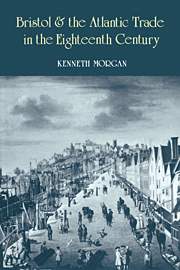Book contents
5 - The slave trade
Published online by Cambridge University Press: 12 October 2009
Summary
Bristol's ‘golden age’ in the eighteenth century coincided with her participation in the Atlantic slave trade. Contemporaries emphasised the city's connection with this infamous branch of commerce by referring to Bristol as ‘that rascally city’ and as ‘a dark den of slave traders’. Their curiosity was aroused by the sight of slave ships in port, by the yarns of seamen with experience of Guinea voyages, and by the occasional presence in the city of blacks as personal servants. In our own century, the Bristol slave trade has retained its fascination. Interest in the topic was stimulated by Marguerite Steen in her popular historical novel The Sun is My Undoing (1941). The slave trade has also become part of local folk wisdom. Bristolians today still associate the name of Blackboy Hill, Redland, and the grave of the African slave, Scipio Africanus, in Henbury churchyard, with the traffic in black cargoes. They recall that the Seven Stars pub, in the lane leading from St Thomas Street to Redcliff Street, was the place where the abolitionist Thomas Clarkson gained information about the conduct of the slave trade from local ship captains and seamen. Some Bristolians are also aware that leading charitable benefactors to their city, notably Edward Colston and the Society of Merchant Venturers, had strong links with the Guinea business. Modern historians have paid much attention to Bristol's role in this trade: several accounts describe the triangular trade from the ‘metropolis of the west’. But though valuable work has appeared in print, especially recently, no one has investigated the rise and decline of Bristol's slave trade within the overall Atlantic trading context of the eighteenth century. This chapter provides such an analysis.
- Type
- Chapter
- Information
- Bristol and the Atlantic Trade in the Eighteenth Century , pp. 128 - 151Publisher: Cambridge University PressPrint publication year: 1993



